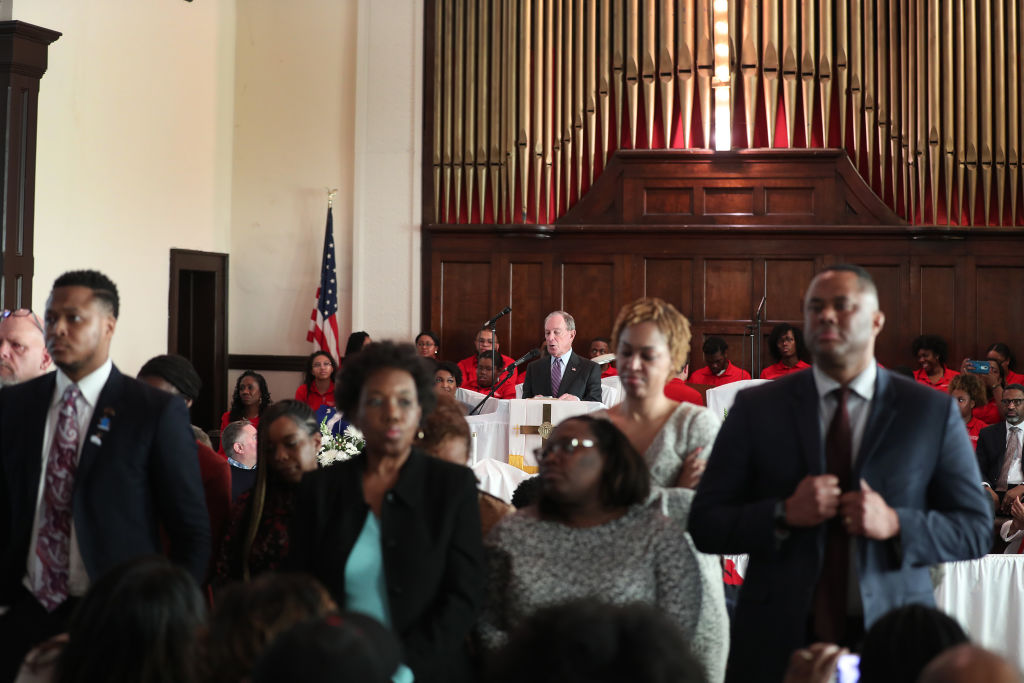Churchgoers in Selma turn their backs on Mike Bloomberg during service


A free daily email with the biggest news stories of the day – and the best features from TheWeek.com
You are now subscribed
Your newsletter sign-up was successful
Several people attending a service at the Brown Chapel in Selma, Alabama, on Sunday turned their backs on former New York Mayor Mike Bloomberg during his speech.
Brown Chapel played a major role in the civil rights movement; leaders held meetings there and it was where the Selma-to-Montgomery marches began. Sunday was the 55th anniversary of Bloody Sunday, when protesters marching for equal voting rights were beaten by white police officers at the Edmund Pettus Bridge, and Democratic presidential hopefuls were in Selma to mark the occasion.
Bloomberg has been roundly criticized for the stop-and-frisk police tactic used while he was mayor. In November, before entering the Democratic presidential race, he apologized for the policy, saying, "I realize back then I was wrong." Pastor Leodis Strong told the congregation that Bloomberg initially turned down his offer to speak, but then reversed course and accepted, showing "a willingness on his part to change."
The Week
Escape your echo chamber. Get the facts behind the news, plus analysis from multiple perspectives.

Sign up for The Week's Free Newsletters
From our morning news briefing to a weekly Good News Newsletter, get the best of The Week delivered directly to your inbox.
From our morning news briefing to a weekly Good News Newsletter, get the best of The Week delivered directly to your inbox.
Ryan Haygood, president and CEO of the New Jersey Institute for Social Justice, told The Guardian that he thought about the way civil rights protesters were brutalized by police officers, and when it was clear Bloomberg didn't plan on mentioning stop-and-frisk during his speech, he decided to stand up and turn his back on Bloomberg. "I thought this would be the place where he could finally say once and for all, 'Let me own what I did, let me atone for it,'" Haygood said. "He didn't even touch it, which is more disrespectful."
A free daily email with the biggest news stories of the day – and the best features from TheWeek.com
Catherine Garcia has worked as a senior writer at The Week since 2014. Her writing and reporting have appeared in Entertainment Weekly, The New York Times, Wirecutter, NBC News and "The Book of Jezebel," among others. She's a graduate of the University of Redlands and the Columbia University Graduate School of Journalism.
-
 Health insurance: Premiums soar as ACA subsidies end
Health insurance: Premiums soar as ACA subsidies endFeature 1.4 million people have dropped coverage
-
 Anthropic: AI triggers the ‘SaaSpocalypse’
Anthropic: AI triggers the ‘SaaSpocalypse’Feature A grim reaper for software services?
-
 NIH director Bhattacharya tapped as acting CDC head
NIH director Bhattacharya tapped as acting CDC headSpeed Read Jay Bhattacharya, a critic of the CDC’s Covid-19 response, will now lead the Centers for Disease Control and Prevention
-
 Nobody seems surprised Wagner's Prigozhin died under suspicious circumstances
Nobody seems surprised Wagner's Prigozhin died under suspicious circumstancesSpeed Read
-
 Western mountain climbers allegedly left Pakistani porter to die on K2
Western mountain climbers allegedly left Pakistani porter to die on K2Speed Read
-
 'Circular saw blades' divide controversial Rio Grande buoys installed by Texas governor
'Circular saw blades' divide controversial Rio Grande buoys installed by Texas governorSpeed Read
-
 Los Angeles city workers stage 1-day walkout over labor conditions
Los Angeles city workers stage 1-day walkout over labor conditionsSpeed Read
-
 Mega Millions jackpot climbs to an estimated $1.55 billion
Mega Millions jackpot climbs to an estimated $1.55 billionSpeed Read
-
 Bangladesh dealing with worst dengue fever outbreak on record
Bangladesh dealing with worst dengue fever outbreak on recordSpeed Read
-
 Glacial outburst flooding in Juneau destroys homes
Glacial outburst flooding in Juneau destroys homesSpeed Read
-
 Scotland seeking 'monster hunters' to search for fabled Loch Ness creature
Scotland seeking 'monster hunters' to search for fabled Loch Ness creatureSpeed Read
